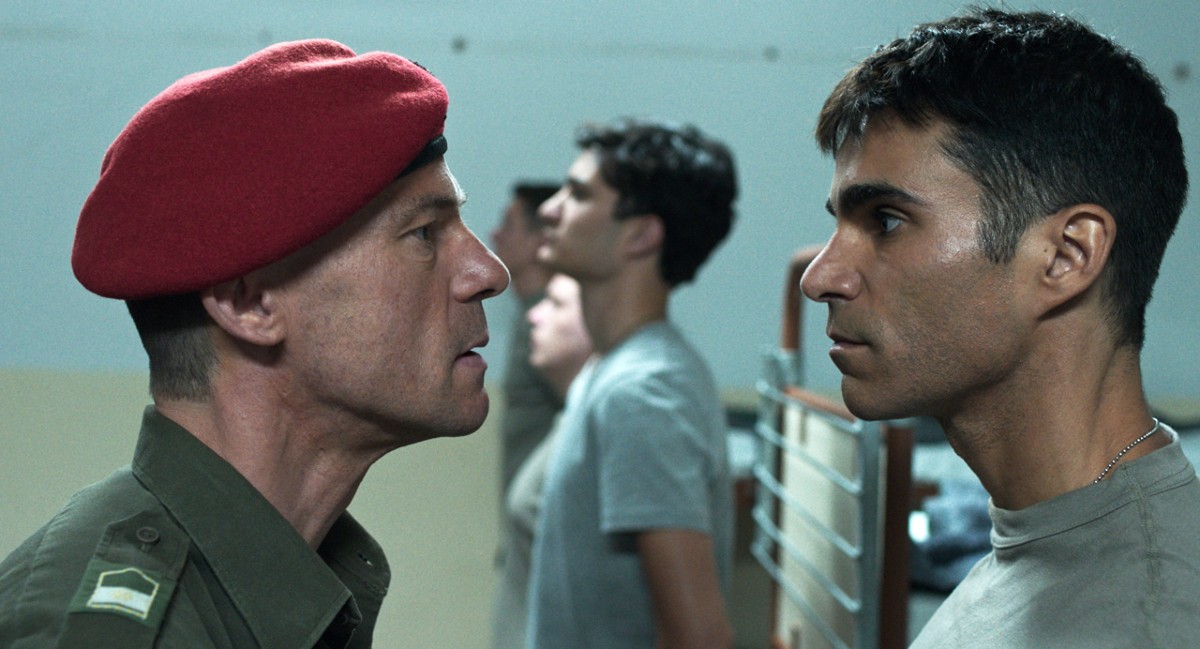As a fresh batch of boot camp recruits moves through processing, a name keeps resurfacing like some kind of curse — as if its mere mention is enough to call down the power of its wrath. “Classic case for Eismayer,” one experienced soldier remarks about a smart-mouthed inductee, while another explains his fake-illness strategy thusly: “Just trying to avoid drillmaster Eismayer.” A legend in the Austrian armed forces, Sergeant Major Charles Eismayer (Gerhard Liebmann) is equal parts bad-ass and martinet, yet what he is, more than anything else, is afraid, and it’s the exploration of this fear that serves as the backbone of “Eismayer.”
A title card at the beginning of the film sets up the story as based on actual events — something that the brutalist architecture, bland color palette, and utilitarian nature of the military base setting reinforces right from the jump. We’re watching a drama, to be sure, yet writer/director David Wagner strips the Hollywood veneer off of his story to present a very different kind of boot camp movie than what audiences have seen before (“Full Metal Jacket,” “Stripes,” “An Officer and a Gentleman,” or even “Biloxi Blues” this is not). For the soldiers of this induction class, this isn’t about maturation, self-discovery, or some twisted version of idealized manhood — this is about survival.
READ MORE: Venice Film Festival Preview: 16 Must-See Films To Watch
In Sgm. Eismayer, these recruits have a real-deal, no-bullshit challenge, too. Tough but not always fair, the drillmaster pushes the soldiers far beyond the necessary limits of their training, something the captain of the base scolds the notorious non-com about during a debrief. A tender (albeit aloof) presence at home with his wife and young son, Eismayer’s brutal posturing when on duty is hiding a deeper secret: one tied to his dark parking lot rendezvous with anonymous men.
An openly gay recruit, Mario Falak (Luka Dimić), shakes something loose inside of Eismayer. And while not ready to make any lasting lifestyle changes as a result, outside forces begin to push the drillmaster out of his comfort zone. As his wife (Julia Koschitz) begins to press him harder on all of his unexplained absences, cough fits in the shower and an obsession with Falak he can’t quite shake begin to pull Eismayer apart at the seams.
READ MORE: Fall 2022 Preview: 60+ Must-See Films To Watch
Wagner’s film bucks several genre trends, most prominently with its focus on the emotional journey of the drill sergeant rather than the recruits. All of the expected scenes on the parade ground, in the barracks, or even within the mess hall are there, with the eponymous sergeant screaming into pinched faces, yet the conflict at the root of all this tension has nothing to do with getting these young men ready for war, and everything to do with the war raging inside of Eismayer.
The film is harrowing and captivating all at once, vacillating between the beautiful and the grotesque from moment to moment. The spartan script, which relies almost entirely on the expression of self-loathing and overcompensation from Eismayer, paints a stark picture of a man using his position of authority as a cudgel against his own inner demons. In Falak, the drillmaster runs headlong into a manifestation of his worst fears, and this confrontation, on both a personal and a professional level, is a fascinating peek inside one man’s mortal struggle for survival.
The way Wagner frames the action in contrast to the quieter domestic moments does half the work, yet even this thoughtful scene juxtaposition and composition would have failed to convey the larger themes were it not for Liebmann’s career-making performance. In between spit-laced tirades, the actor conveys micro-doses of doubt and hesitation that betray the character’s legendarily brutal exterior, and it’s here where the story truly unfolds and tells the audience everything they need to know about this man. Anyone on the lookout for an untapped acting resource should take note of Liebmann’s performance.
A minimalist masterpiece with clean narrative lines and striking visual economy, the only thing that gets short-shrift in “Eismayer” is Koschitz’s role, which comes and goes at the whims of the A-plot. The script doesn’t allow for much exploration of the wife’s part in all of this, except that she has a vague idea that something’s wrong early in the picture and is eventually proven right. A warm and affectionate scene between Eismayer and his son late in the film gives some much-needed consideration to the life that this struggling husband and father is possibly leaving behind in his quest to discover his best, truest self. Including a similar scene between the sergeant and his wife would have been nice.
That’s a minor quibble regarding an otherwise stunning achievement, one that reframes the discussion not just around the sub-genre of the boot camp drama but any personal journey of exploration. And while Liebmann steals the show here, what Wagner realizes with his film is every bit as impressive. The writer-director’s script and steady hand behind the camera breathe life into a bracing, heartbreaking, and ultimately reaffirming picture. [A-]
Follow along with all our coverage of the 2022 Venice Film Festival.





